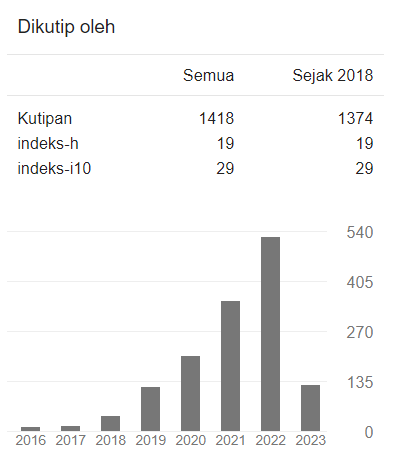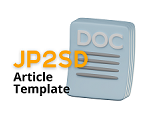ANALISIS MOTIVASI BELAJAR PESERTA DIDIK MELALUI PEMBERIAN REWARD DAN PUNISHMENT DI SDN NGARINGAN 05 KEC.GANDUSARI KAB.BLITAR
DOI:
https://doi.org/10.22219/jp2sd.v5i2.4828Keywords:
learning motivation, reward and punishmenAbstract
ABSTRACT: This study aims to analyze the motivation of learners through the provision of reward and punishment in SDN Ngaringan 05. This study used a descriptive quantitative approach. Number of samples 22 learners. Data obtained through the instruments developed researcher with the item number of instruments as much as 10 items. Measurement of the individual statements using a Likert scale, namely: 1) strongly disagree; 2) do not agree; 3) doubtful; 4) agree and 5) strongly agree. Data collection techniques used are questionnaires and interviews unstructured. The results showed that administration of reward and punisment
can provide major influence on students' motivation. The right strategy will affect the learning process is increasing continuously achieve maximum results. To the teacher strives to motivate learners so that they are more interested in the learning process. One way to giving reward and punisment didactic. Demonstrated a high percentage of the results of research in which 73% of students feel happy if the work / tasks performed to get an award from Mr / Mrs teacher. 59% said it does not agree that there are learners who arrive late and often reprimanded Mr / Mrs teacher. 64% of students agreed that learners feel embarrassed if too frequent violations.
Keywords: learning motivation, reward and punishmen
ABSTRAK: Penelitian ini bertujuan untuk menganalisis motivasi belajar peserta didik
melalui pemberian reward dan punishment di SDN Ngaringan 05. Penelitian ini
menggunakan pendekatan kuantitatif jenis deskriptif. Jumlah sampel 22 peserta didik. Data diperoleh melalui instrumen yang dikembangkan peneliti dengan jumlah item instrumen sebanyak 10 item. Pengukuran terhadap masing-masing pernyataan menggunakan skala Likert, yaitu: 1) sangat tidak setuju; 2) tidak setuju; 3) ragu-ragu; 4) setuju dan 5) sangat setuju.Teknik pengumpulan data yang digunakan adalah angket dan wawancara tidak terstruktur. Hasil penelitian menunjukkan bahwa pemberian reward dan punisment dapat memberikan pengaruh besar terhadap motivasi belajar siswa. Strategi yang tepat akan mempengaruhi proses pembelajaran semakin meningkat secara terus menerus mencapai hasil yang maksimal. Untuk itu guru senantiasa berupaya memotivasi peserta didik agar
mereka lebih tertarik untuk mengikuti proses pembelajaran. Salah satu caranya dengan cara memberikan reward dan punisment yang bersifat mendidik. Prosentase tinggi ditunjukkan dari hasil penelitian dimana 73% peserta didik merasa senang jika pekerjaan/tugas yang dilaksanakan mendapatkan penghargaan dari Bapak/Ibu Gurunya. 59% menyatakan sangat tidak setuju jika peserta didik ada yang datang terlambat dan sering mendapat teguran dari Bapak/Ibu guru. 64% siswa menyatakan setuju bahwa peserta didik merasa malu jika terlalu sering melakukan pelanggaran.
Kata kunci : motivasi belajar, reward dan punishmen
Downloads
Downloads
Published
Issue
Section
License
Authors who publish with Jurnal Pemikiran dan Pengembangan Sekolah Dasar (JP2SD) agree to the following terms:
- For all articles published in Jurnal Pemikiran dan Pengembangan Sekolah Dasar (JP2SD), copyright is retained by the authors. Authors give permission to the publisher to announce the work with conditions. When the manuscript is accepted for publication, the authors agree to automatic transfer of the publishing right to the publisher.
- Authors retain copyright and grant the journal right of first publication with the work simultaneously licensed under a Creative Commons Attribution-ShareAlike 4.0 International License that allows others to share the work with an acknowledgment of the work's authorship and initial publication in this journal.
- Authors are able to enter into separate, additional contractual arrangements for the non-exclusive distribution of the journal's published version of the work (e.g., post it to an institutional repository or publish it in a book), with an acknowledgment of its initial publication in this journal.
- Authors are permitted and encouraged to post their work online (e.g., in institutional repositories or on their website) prior to and during the submission process, as it can lead to productive exchanges, as well as earlier and greater citation of published work (See The Effect of Open Access).

This work is licensed under a Creative Commons Attribution-ShareAlike 4.0 International License.



















